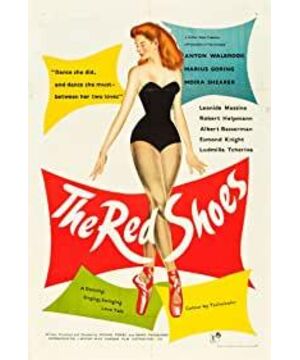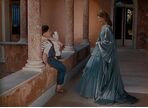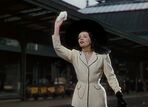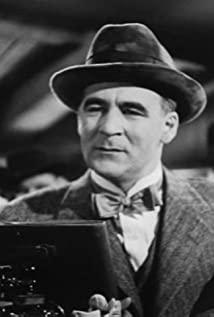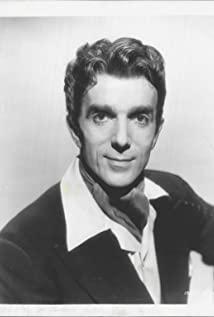The plot is still uncomplicated, ballerina Vicky falls in love with young composer Krast while rehearsing the dance drama "The Red Shoes" based on Andersen's fairy tale, despite the opposition of the troupe owner Lermontov and marry him. But the mediocre life after marriage made her miss the stage all the time, because her life belongs to art rather than worldly life. Until she was finally persuaded by Lermontov to repeat "The Red Shoes", but she had to face the choice between her husband and the stage; at the end, when she finally decided to give up the performance, she chased after her desperately. When going to her husband, she stumbled and fell off the railroad tracks and lost her life.
It is unforgettable that at the end her husband slowly took off the red dancing shoes from her feet, just like the metaphor of the shoemaker taking off the red dancing shoes for the dead little girl in the fairy tale.
Although the plot is so gloomy that it makes me a little scared, it is worth pondering after watching it. Some people commented on the Internet that they hated her husband Krast the most, thinking that Vicky's death was forced by him, but I also don't like Lermontov. It was he who excluded actresses from marriage and love for the sake of his artistic value; He believes that actresses who are immersed in personal feelings are stupid and cannot perform real art. Only by fully devoting themselves to dance and seeing it as life can they perform to the purest and noblest realm.
There is nothing wrong in his thinking, even if Vicky's pursuit of personal happiness is dominated; doesn't art require dedication? So I just have a personal emotional dislike for him. And what's wrong with Craster? But after all, it was he who forced Vicky to give up her dancing career, and it was still chilling to watch. In other words: men are selfish, although it is related to art and the value of life. As at the beginning Vicky's aunt recommended Vicky to Lermontov, but was arrogantly rejected; until he first saw Vicky at the wine table and asked her why she was dancing, she asked him why he was alive, and told him that it was also her answer. I think Lermontov is most interested in this type of actor: an actor who regards dance as his life.
Lermontov's feelings for Vicky must be complicated. She is the heroine he held in one hand. She has realized his artistic dream and pursuit. He has created several excellent dance dramas for her. She is his treasure; he cherishes her like a rare treasure. Don't allow others to touch her emotional world, even if he himself can't give her pure love. He didn't allow anyone else to perform "The Red Shoes" because he was convinced that only she deserved it...or that the artist needed to have such madness; there is no doubt that Lermontov was a real artist. What a "charming devil," as Vicky's aunt put it.
There are a lot of ballet performances in the film, which are so beautiful that I can't help but be fascinated by how beautiful it would be if I could dance and dance like this myself. I really liked those red shoes, they were beautiful beyond description; another "fascinating devil". I was completely absorbed in that music and dance, albeit gloomy and unwarm.
There have been many reviews of the film, and the focus seems to be mostly on Vicky. So I won't go into details on this one, because the significance of Vicky's character is obvious. And she really died for art in the end, in a sense, there is no regret.
This actress has bright red hair, which is not my favorite red at first, but as I watched more and more, I gradually appreciated her more and more; except the stage makeup is a bit scary, especially the eyes, but it is very unique , still appreciate it. I like the knee-length white gauze ballet skirts of that era. When I lift my legs, the skirt draws a beautiful arc, so beautiful. There are also the downed hair and the ribbon hanging down from the back of the head, fluttering to the melody.
I saw a very profound comment:
Material desires may blind your mind for a while, but in the end you will find that everything in front of you is not the ultimate happiness in your mind, only the pursuit of career and ideals is the destination of life, maybe you are going one way. Painful road, but difficult and difficult, Yuyu Yucheng. Maybe you will be lonely in your lifetime, but you will smile Jiuquan.
I'd rather put on these red dancing shoes and dance forever, rather than have fun and die in style. In my dream, I saw many people dancing happily on the stage of life with me, even for the rest of my life.
PS. Some online commentators mentioned Qiu Yuefeng's wonderful dubbing (with Lermontov), I watched it on the English soundtrack this time, and played it back on the above-translated soundtrack to listen to it. I can't imagine how the actors in the dubbing in the late 1970s understood such a difficult subject; and how many audiences were able to understand the true meaning of the film in the early 1980s.
View more about The Red Shoes reviews


